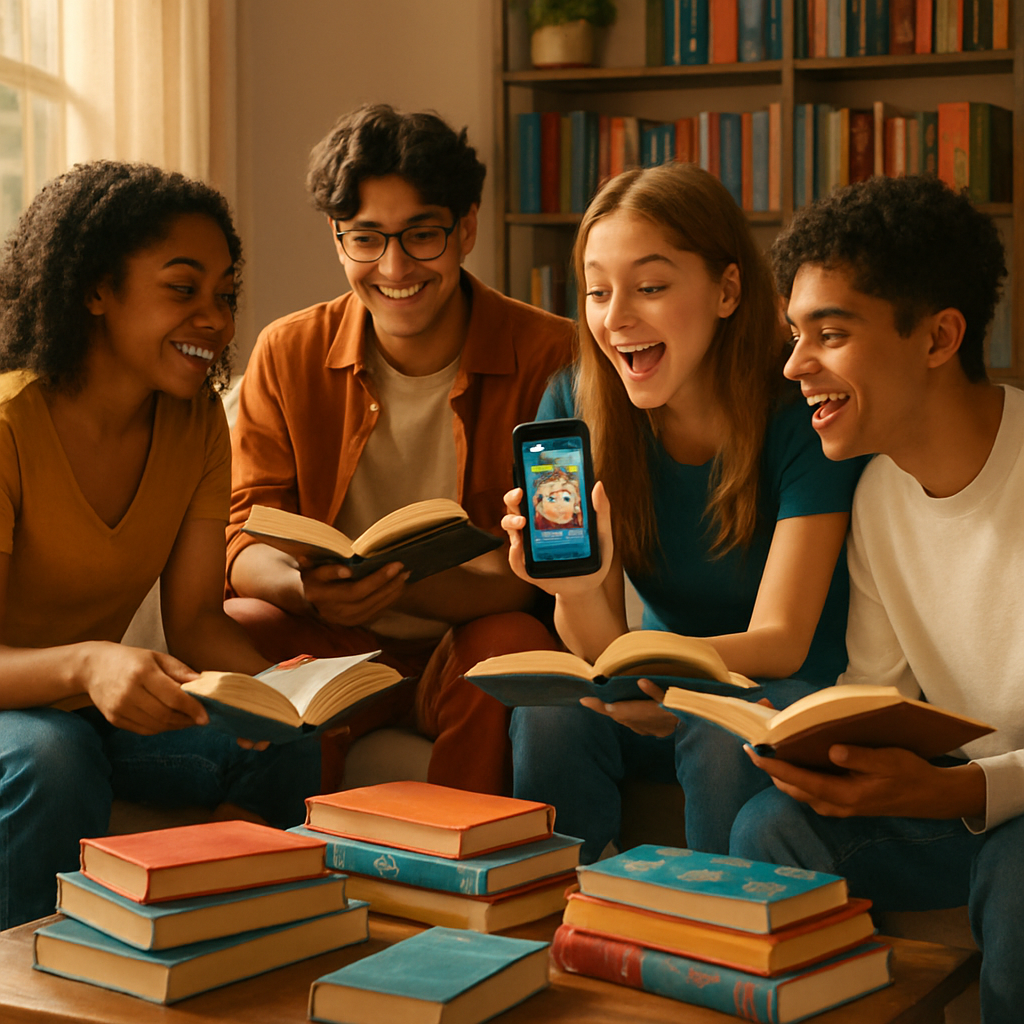The Rise of BookTok and Its Impact on Reading Culture

Social media has transformed virtually every aspect of our lives, from how we connect with friends to how we shop for groceries. Now it’s changing the way we read books too. TikTok, with its short-form video format, might seem like an unlikely champion for literature, but the platform’s BookTok community has emerged as a powerful force in publishing, sending decades-old titles soaring to bestseller status overnight and turning unknown authors into literary stars.
BookTok the corner of TikTok dedicated to book recommendations, reviews, and literary discussions has grown from a niche interest group to a cultural phenomenon that publishers, booksellers, and authors can no longer ignore. What started as readers sharing their emotional reactions to books has evolved into a full-fledged literary movement with real-world impacts on book sales, publishing trends, and reading habits.
From Tearful Reviews to Publishing Powerhouse
BookTok took off during the pandemic when lockdowns left people searching for both entertainment and connection. Videos of readers sobbing over emotional endings or gasping at plot twists offered both. The authenticity of these reactions raw, unfiltered, and deeply personal resonated with viewers in a way that traditional book reviews rarely do.
“I never expected to sell so many copies of a book I wrote seven years ago,” said author Colleen Hoover in a New York Times interview. Her novel “It Ends With Us,” published in 2016, became a massive bestseller in 2021 after BookTok users began posting videos of themselves crying while reading it. The book sold over a million copies in 2021 alone five years after its initial release.
This isn’t just anecdotal. According to NPD BookScan, which tracks book sales in the U.S., titles popular on BookTok have seen sales increases of 300% to 1000%. Barnes & Noble now features “BookTok” tables in their stores, while publishers scramble to get their titles in front of TikTok creators.
What makes BookTok different from previous social media book communities? For one thing, it’s the speed and scale of influence. A single viral video can generate thousands of sales within days. For another, it’s the demographic BookTok skews young, with many users in their teens and twenties, a group traditionally difficult for publishers to reach.
The algorithm plays a crucial role too. TikTok’s eerily accurate recommendation system can place book videos in front of users who didn’t even know they were looking for reading suggestions. Someone who watches cooking videos might suddenly receive a BookTok recommendation for a food-themed romance novel, creating readers from non-readers.
I saw this firsthand when my 15-year-old niece, who had never shown interest in reading, suddenly asked me for “The Seven Husbands of Evelyn Hugo” after seeing countless TikToks about it. Three weeks later, she had finished not just that book but two others by the same author. “The videos made the books seem exciting, not boring like school reading,” she told me.
Changing What We Read and How We Read It
BookTok hasn’t just affected sales figures it’s reshaping reading preferences and habits. Romance and young adult fiction dominate the platform, with fantasy, contemporary fiction, and thrillers also performing well. Literary fiction and non-fiction, while present, generally generate less enthusiasm.
This has led to criticism that BookTok promotes a limited range of books, often focusing on emotional impact over literary merit. Critics point to the prevalence of what some call “BookTok aesthetic” books with similar themes, tropes, and even cover designs that seem tailored to generate viral reactions.
“There’s definitely a formula to what works on BookTok,” says Melissa, who runs a bookstore in Portland. “Books with twists, tear-jerker endings, spicy romance scenes these are elements that create strong reactions, which make for compelling videos.”
The platform has also contributed to the rise of “reading challenges” and quantified reading goals. BookTok users often participate in challenges to read a certain number of books per month or year, sometimes tracking their progress through spreadsheets or apps. This gamification of reading has both advocates and critics.
“I love seeing young people excited about reading again,” says Dr. Emma Richardson, a literacy researcher. “But I worry about the focus on quantity over deep engagement with texts. Reading fifty books a year means little if you’re not processing what you read.”
The platform has influenced not just what people read but how they talk about books. BookTok has its own vocabulary: books aren’t just good, they’re “life-changing” or they “destroyed me.” Romantic scenes aren’t steamy, they’re “spicy.” Characters don’t have chemistry, they have “tension.” This language has seeped into mainstream book discourse, showing up in marketing materials and even professional reviews.
Reading itself has become more performative. Many BookTokers film themselves reading, crying over emotional scenes, or arranging aesthetic “book nooks” with candles, coffee, and color-coordinated bookshelves. For some critics, this represents the commodification of reading turning a private intellectual experience into content for consumption.
Yet defenders point out that reading has always been social in some way, from book clubs to literary salons. BookTok simply digitizes and amplifies this social aspect of reading.
Democratizing Publishing or Creating New Gatekeepers?
BookTok has unquestionably democratized book discovery to some extent. Traditional publishing has long been criticized for its homogeneity both in terms of who gets published and what types of books receive marketing support. BookTok has helped elevate voices that might otherwise have been overlooked.
Authors from marginalized communities have found audiences through BookTok that traditional publishing marketing might never have reached. Self-published authors, too, have benefited from the platform’s ability to bypass traditional gatekeepers.
“My book was rejected by thirty-seven agents,” said indie author Rebecca Watson. “Then a BookToker with 50,000 followers featured it in a video, and I sold 10,000 copies in a month. Now I have a three-book deal with a major publisher.”
Yet BookTok has created its own form of gatekeeping. The algorithm favors certain types of content, and the most influential BookTokers some with millions of followers have become power players in their own right. Publishers now court these influencers with free books, merchandise, and even paid partnerships, raising questions about authenticity and disclosure.
The speed of BookTok trends can also be problematic. Books rise and fall from favor quickly, sometimes before readers have even finished them. This creates a culture of constant consumption rather than thoughtful engagement.
“I feel pressure to keep up with what’s trending,” admitted one BookToker who asked to remain anonymous. “Sometimes I post about books I haven’t even finished because I know they’ll get views. That’s not great for literary culture, but it’s how the platform works.”
The future relationship between BookTok and publishing remains uncertain. Will publishers continue to chase BookTok trends, potentially homogenizing their output? Will BookTok itself evolve beyond its current preferences? Or will new platforms emerge to challenge its dominance?
What’s clear is that BookTok has permanently altered the literary landscape. For better or worse, it has brought reading into the social media age, making books part of the online conversation in a way they haven’t been before.
Perhaps the most positive aspect of BookTok is simply that it’s getting people especially young people excited about reading again. In an era of declining reading rates and shrinking attention spans, any force that puts books in people’s hands deserves some appreciation.
As one middle school teacher told me, “I don’t care if they’re reading the most literary books or if they’re partly reading to make TikToks. They’re reading voluntarily, and that’s a win.” In a world where books compete with endless digital distractions, BookTok has made reading cool again and that might be its most important impact of all.


